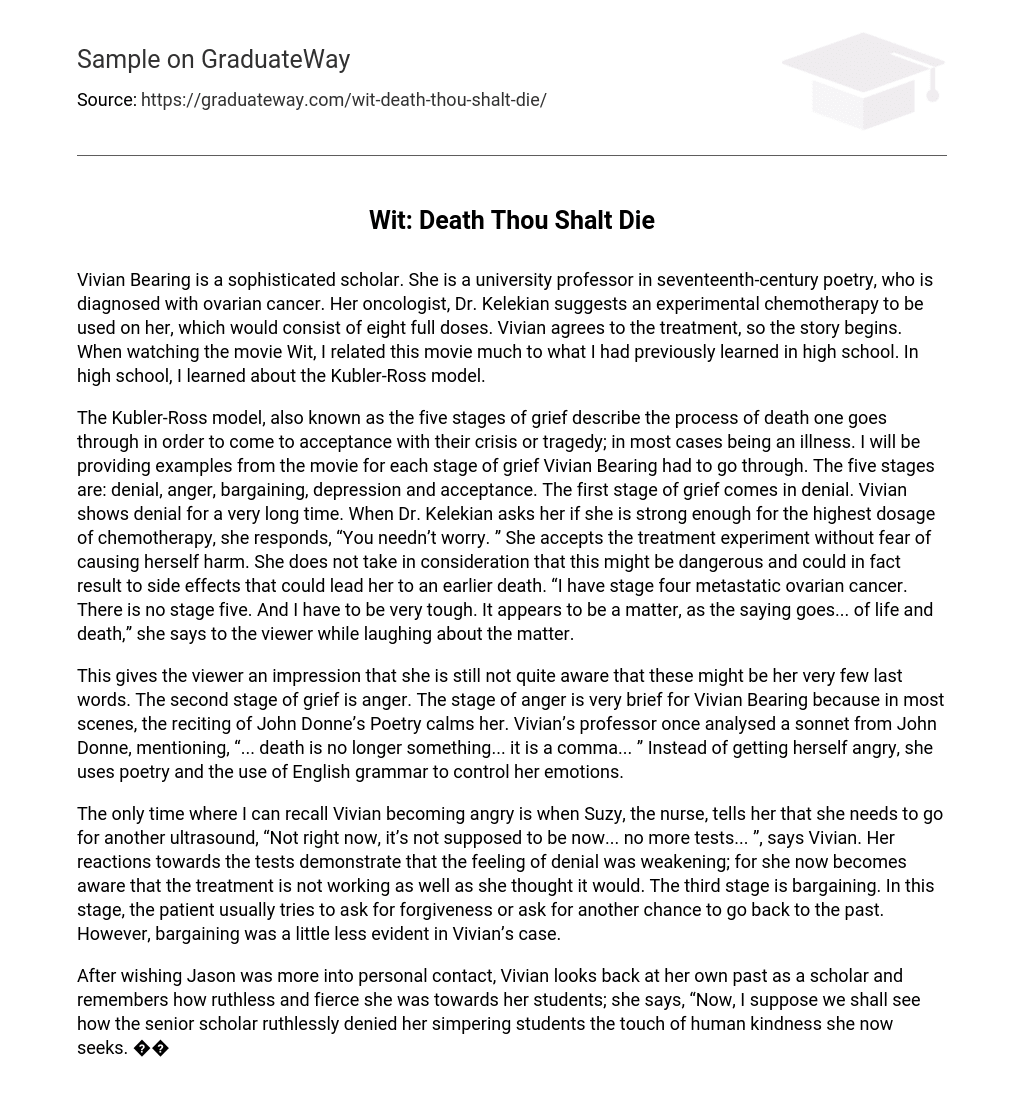Vivian Bearing is a sophisticated scholar. She is a university professor in seventeenth-century poetry, who is diagnosed with ovarian cancer. Her oncologist, Dr. Kelekian suggests an experimental chemotherapy to be used on her, which would consist of eight full doses. Vivian agrees to the treatment, so the story begins. When watching the movie Wit, I related this movie much to what I had previously learned in high school. In high school, I learned about the Kubler-Ross model.
The Kubler-Ross model, also known as the five stages of grief describe the process of death one goes through in order to come to acceptance with their crisis or tragedy; in most cases being an illness. I will be providing examples from the movie for each stage of grief Vivian Bearing had to go through. The five stages are: denial, anger, bargaining, depression and acceptance. The first stage of grief comes in denial. Vivian shows denial for a very long time. When Dr. Kelekian asks her if she is strong enough for the highest dosage of chemotherapy, she responds, “You needn’t worry. ” She accepts the treatment experiment without fear of causing herself harm. She does not take in consideration that this might be dangerous and could in fact result to side effects that could lead her to an earlier death. “I have stage four metastatic ovarian cancer. There is no stage five. And I have to be very tough. It appears to be a matter, as the saying goes… of life and death,” she says to the viewer while laughing about the matter.
This gives the viewer an impression that she is still not quite aware that these might be her very few last words. The second stage of grief is anger. The stage of anger is very brief for Vivian Bearing because in most scenes, the reciting of John Donne’s Poetry calms her. Vivian’s professor once analysed a sonnet from John Donne, mentioning, “… death is no longer something… it is a comma… ” Instead of getting herself angry, she uses poetry and the use of English grammar to control her emotions.
The only time where I can recall Vivian becoming angry is when Suzy, the nurse, tells her that she needs to go for another ultrasound, “Not right now, it’s not supposed to be now… no more tests… ”, says Vivian. Her reactions towards the tests demonstrate that the feeling of denial was weakening; for she now becomes aware that the treatment is not working as well as she thought it would. The third stage is bargaining. In this stage, the patient usually tries to ask for forgiveness or ask for another chance to go back to the past. However, bargaining was a little less evident in Vivian’s case.
After wishing Jason was more into personal contact, Vivian looks back at her own past as a scholar and remembers how ruthless and fierce she was towards her students; she says, “Now, I suppose we shall see how the senior scholar ruthlessly denied her simpering students the touch of human kindness she now seeks. ” This indicates her longing for warmth and comfort. The feeling of regret. The fourth stage is depression. After recalling her past memories as a teacher, she goes from being a tough, independent woman, who fears nothing to a fragile, ill patient. “I’m scared… I don’t feel so sure of myself anymore,” cries Vivian to Suzy.
I believe this is the moment in the movie where she goes through depression. Lack of communication, having no visitors and being isolated in the hospital, were also contributing factors to her depression. The final stage for the process of death is acceptance. She always had a sense of acceptance towards her illness but it was quite difficult for the viewer to understand because she never showed much emotion towards her loss. However, I believe acceptance became more evident towards the end when Suzy proposed the two different options she has in case her heart stops beating. Vivian chooses to be DNR.





